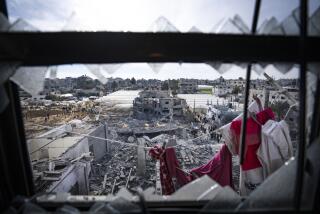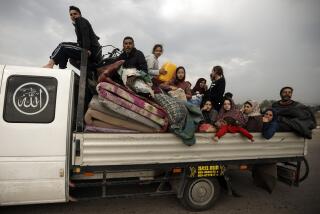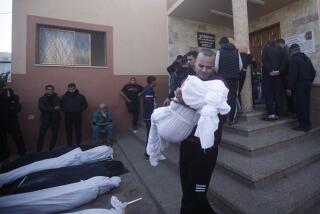Anti-Taliban Forces Meet Resistance Near Kandahar
- Share via
QUETTA, Pakistan — Ethnic Pushtun forces fighting to capture Afghanistan’s second-largest city from the Taliban ran into heavy resistance Sunday as they inched north toward Kandahar airport, according to a report from the area.
“We’ve entered into the suburbs of the airport, but we are not inside the airport yet,” said Khalid Pushtoon, a close aide to the force commander, Gul Agha Shirzai. “We can’t go further right now because the Arabs are fighting very hard.”
However, another group of anti-Taliban fighters, under the command of Pushtun tribal chief Hamid Karzai, reportedly advanced several miles toward the city from the northwest without firing a shot. Reached by satellite telephone late Sunday, Karzai said his forces were about 20 miles northwest of Kandahar.
As military pressure on Kandahar intensified, new evidence emerged that some senior members of the Taliban had secretly contacted Pushtun tribal leaders to explore how to negotiate the city’s surrender. It was clear, however, that the contacts did not have the blessing of the Taliban’s leader, Mullah Mohammed Omar.
Pushtoon described the fighting near Kandahar airport in an interview via satellite telephone. He said he was speaking from the battle area. But as with most descriptions of the fight to oust the Taliban from its biggest remaining stronghold, there was no way to verify his account independently.
Pushtoon said that, after advancing to within about a mile south of the airport, Shirzai’s forces had taken up defensive positions and successfully repulsed four separate counterattacks. U.S. aircraft were reportedly active Sunday, carrying out airstrikes both at the airport and on targets in the city itself.
Pushtoon estimated that the largely Arab force opposing Shirzai’s fighters could number as many as 1,000. Although Arab units, part of Osama bin Laden’s Al Qaeda terrorist network, were known to be in the airport area, they generally have been thought to be smaller in number.
Pushtoon said fighting went on for more than 13 hours before calm settled over the area just before dawn Sunday.
“Right now, we’re just waiting,” he said, just before dusk Sunday.
Shirzai began his campaign a week ago by capturing a section of the main road that runs south from Kandahar to the Pakistani border. After a pause of several days, his forces captured strategic high ground west of the airport Friday, then fought their way Saturday to within about 2 1/2 miles of the airport. The airport is just south of the city.
By contrast, Karzai’s forces advanced more than 20 miles to the town of Khakraiz and were reported to be moving toward another town, Dahla, about 11 miles north of Kandahar.
“We are about [19 miles] from the city,” Karzai said. He said there had been no fighting during the advance and that instead, members of the force had contacted Taliban commanders in Khakraiz and convinced them to leave.
Karzai’s brother, Ahmed, speaking from Quetta, a Pakistani city about 130 miles southeast of Kandahar, indicated that his brother had already contacted Taliban commanders in Dahla and hoped to continue his advance peacefully.
“We are not going to attack Kandahar city,” Hamid Karzai said. “We are not going to go forward by force, but by popular movements. We want people to take over each town all the way to Kandahar.”
That tactic could be hard to sustain, however, as the soldiers near the city, where Arabs and hard-core units loyal to Taliban leader Omar are believed to be operating.
In Quetta, another prominent Afghan tribal chief, Abdul Khaliq, told a small group of reporters that Taliban government ministers, including Justice Minister Nooruddin Turabi, had contacted him wanting to talk about a negotiated end to the fighting.
“We discussed it a lot,” Khaliq said. “He said he’d meet with friends and try to convince Mullah Omar.”
Another important anti-Taliban figure reported similar contacts last week but asked that no names be mentioned. Khaliq also said that he had met with several Taliban commanders at the Pakistani border town of Chaman and that few appeared interested in fighting on.
“There are a lot of Taliban commanders no longer ready to fight,” he said.
As anti-Taliban forces made their way closer to the city, refugees fleeing Kandahar reported continued U.S. airstrikes and deteriorating conditions.
A farmer who shares the name of the tribal chief Abdul Khaliq said he had left Kandahar early Sunday for Pakistan. He spoke of heavy bombing around the airport as well as strikes on vehicles on the road.
“Of course we are afraid, because the bombs fall from the sky and they do not have eyes to see where they are going,” he said.
The airstrikes and fighting south of the airport, plus the increasingly difficult situation in the city, had sent new waves of refugees southward. More than one of these people carried the rumor that a house in which Omar had been eating Saturday evening had been hit by a bomb.
In front of a Pakistani border post Sunday, large numbers of exhausted, frightened families waited in a no man’s land hoping to be processed into a recently erected U.N. refugee camp only a few yards inside Pakistani territory.
Also Sunday, Northern Alliance commanders in the north said they had issued an ultimatum demanding the surrender of as many as 2,000 Taliban fighters.
Ata Mohammed, one of three top generals in Mazar-i-Sharif, said Taliban forces in the towns of Balkh and Chemtal would be given until tonight to lay down their arms.
“I don’t think they’ll resist because they do not want to fight against the whole of northern Afghanistan,” said another commander, Haji Mohammed Mukhaqiq.
Ata Mohammed said that an unknown number of the fighters are foreigners and that they can expect to be deported home or to a third country to face justice.
“We don’t want them here,” he said. “We are going to get them out of the country.”
*
Times staff writer Maura Reynolds in Mazar-i-Sharif contributed to this report.
More to Read
Sign up for Essential California
The most important California stories and recommendations in your inbox every morning.
You may occasionally receive promotional content from the Los Angeles Times.













